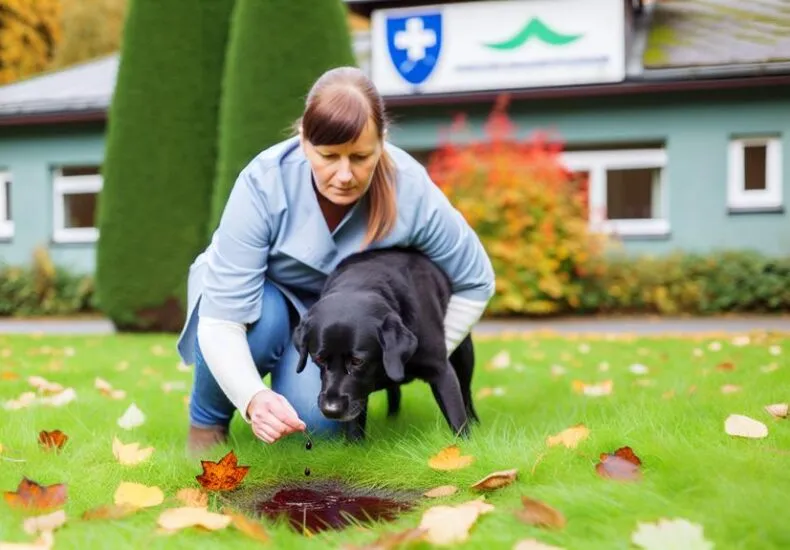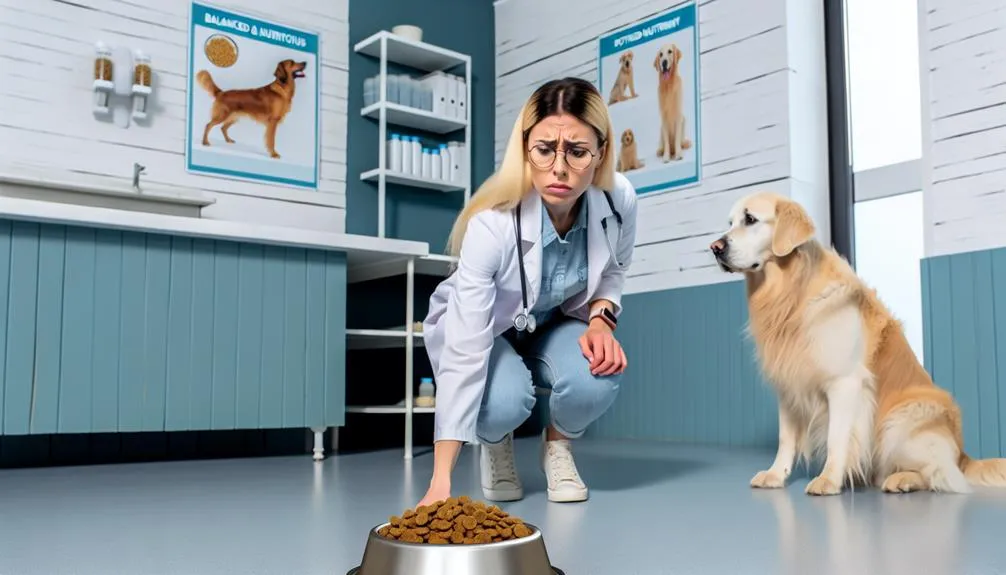
Why Is My Dog Pooping Blood
It's as if your dog has decided to turn its bathroom habits into a horror movie. When you notice blood in your dog's stool, it can be alarming and confusing, leaving you wondering what's really going on. There are numerous potential causes behind this concerning symptom, some of which could indicate serious Health issues. Understanding the underlying factors is vital for your dog's health, but what should you look out for first?
Common Causes of Blood in Stool
When you notice blood in your dog's stool, it's understandably concerning, and there are several common causes to evaluate. One of the primary reasons for blood in your dog's stool is gastrointestinal issues, such as infections or parasites. Conditions like parvovirus or bacterial infections can lead to inflammation and bleeding in the intestines. If your dog's stool consistency is abnormal, such as being softer or more liquid than usual, it might indicate underlying gastrointestinal distress.
Another possible cause is dietary indiscretion. Dogs often eat things they shouldn't, which can irritate their digestive system and result in bleeding. If your dog has recently changed diets or indulged in table scraps, this could explain the problem.
Additionally, conditions like colitis or inflammatory bowel disease can lead to blood in the stool. These issues often cause changes in stool consistency, including mucus or watery feces, and may require veterinary attention.
Lastly, tumors or polyps in the gastrointestinal tract can also be a concern, especially in older dogs. While this isn't the most common cause, it's important to take it into account if other symptoms accompany the blood in the stool.
Monitoring your dog's overall health and stool consistency is essential. If you notice persistent blood, consult your veterinarian for a proper diagnosis and treatment. Early intervention can make a significant difference in your dog's health and well-being.
Symptoms to Monitor
Keeping an eye on your dog's overall behavior and physical condition is essential when you notice blood in their stool. Observing any behavior changes can provide critical insights into their health status. For instance, if your dog suddenly becomes lethargic, it may indicate an underlying issue that needs attention. Pay close attention to their energy levels, appetite, and interest in activities they usually enjoy.
You should also monitor for signs of distress or discomfort. If your dog appears to be in pain, shows reluctance to move, or has difficulty lying down, these symptoms could signal a more serious condition. Additionally, watch for changes in their bathroom habits, such as straining to defecate or having diarrhea, as these can also be red flags.
Stress factors can greatly impact your dog's health. Changes in their environment, such as new pets, moving homes, or alterations in your routine, can lead to Anxiety. If you notice behavioral changes corresponding with such stressors, it's important to address them promptly. Stress can exacerbate gastrointestinal issues, which may contribute to the presence of blood in their stool.
Always consult with a veterinarian if you observe any concerning symptoms. Early intervention can make a notable difference in your dog's health outcome. By closely monitoring your dog's behavior and physical condition, you can better support their well-being during this troubling time.
Potential Dietary Issues

If your dog is pooping blood, dietary issues could be a significant factor. Food Allergies or sensitivities to certain ingredients might cause gastrointestinal distress, leading to this alarming symptom. Additionally, poor-quality ingredients in their diet can exacerbate digestive problems, making it essential to evaluate what you're feeding your pet.
Food Allergies and Sensitivities
Food Allergies and sensitivities can be significant contributors to gastrointestinal issues in dogs, including the alarming symptom of bloody stools. If you suspect your dog may have a food allergy, it's crucial to reflect on making dietary adjustments and conducting thorough ingredient research.
Start by observing your dog for any signs of food intolerance or allergy, which may include:
- Excessive itching or scratching
- Vomiting or diarrhea
- Gas or bloating
- Changes in appetite or weight
Identifying the specific food causing an issue can be challenging. You may need to eliminate certain ingredients from their diet temporarily and reintroduce them one at a time. This process can help pinpoint allergens. Collaborating with your veterinarian can also provide valuable insights and guarantee your dog receives a balanced diet while addressing their sensitivities.
Once you identify problematic ingredients, you can tailor your dog's diet to avoid these allergens, supporting their digestive health and overall well-being. Remember, your dog's health is paramount, so staying vigilant about their dietary needs and potential sensitivities is key to preventing serious gastrointestinal issues, including bloody stools.
Poor-Quality Ingredients Impact
Low-quality ingredients in your dog's food can greatly impact their digestive health and lead to serious issues, including bloody stools. Many commercial pet foods use poorly sourced ingredients, which can create a host of problems. When you feed your dog low-quality food, you might expose them to fillers and artificial additives that their digestive systems struggle to process.
These ingredients can result in nutritional deficiencies, depriving your dog of essential vitamins and minerals. Such deficiencies can weaken their immune system and lead to gastrointestinal issues, which may manifest as diarrhea or bloody stools. If you notice blood in your dog's feces, it's essential to evaluate their diet.
Ingredient sourcing plays a significant role in the overall quality of your dog's food. Opting for brands that prioritize high-quality, whole ingredients can make a noticeable difference in your dog's health. Always check the ingredient list and choose foods that contain named meats, wholesome grains, and no artificial preservatives. By making informed dietary choices, you can help maintain your dog's digestive health and prevent potentially serious issues like bloody stools.
Infections and Parasites
When a dog is pooping blood, one of the potential causes could be infections or parasites. Both bacterial infections and intestinal parasites can lead to significant gastrointestinal distress, resulting in bloody stools. It's vital to recognize the signs and seek veterinary assistance promptly.
Bacterial infections can arise from various sources, including contaminated food or water. Symptoms may include diarrhea, vomiting, and lethargy, in addition to blood in the stool. Common bacterial culprits include Salmonella and E. coli, which require immediate treatment to prevent further complications.
Intestinal parasites, such as worms, are another common cause of bloody stools. These parasites can damage the intestinal lining, leading to bleeding. Keep an eye out for symptoms like:
- Weight loss despite a good appetite
- Diarrhea, sometimes with mucus or blood
- Abdominal pain or bloating
- Visible worms in the feces or around the anus
If you notice any of these signs, it's important to visit a veterinarian. They can perform tests to identify the specific infection or parasite affecting your dog. Treatment typically involves antibiotics for bacterial infections and deworming medications for parasitic infections.
Inflammatory Bowel Disease

In addition to infections and parasites, inflammatory bowel disease (IBD) is another potential reason your dog might be experiencing bloody stools. IBD is a chronic condition characterized by inflammation of the gastrointestinal tract, which can lead to various symptoms, including diarrhea, vomiting, and weight loss. If you notice these signs alongside bloody stools, it's important to consult your veterinarian for a proper diagnosis.
To diagnose IBD, your vet may recommend a series of diagnostic procedures. These often include blood tests, fecal examinations, and imaging studies such as X-rays or ultrasounds. In some cases, a biopsy may be necessary to confirm the diagnosis and rule out other conditions. Understanding the underlying cause of your dog's IBD is significant for determining the appropriate treatment.
Treatment options for IBD typically involve a combination of dietary changes and medications. Your vet may suggest a special diet that's easily digestible and free from irritants. Common dietary recommendations include hypoallergenic or prescription diets. Additionally, anti-inflammatory medications, immunosuppressants, or antibiotics may be prescribed to help manage inflammation and restore gut health.
It's important to monitor your dog's response to treatment closely. Regular follow-ups with your veterinarian will help guarantee that your dog receives the best care possible and that any necessary adjustments are made to their treatment plan. Always seek professional guidance when dealing with IBD to guarantee the best outcomes for your furry friend.
Tumors and Other Serious Conditions
Certain serious conditions, including tumors, can also lead to bloody stools in dogs. Tumors can arise in various parts of the gastrointestinal tract, causing various symptoms based on their location and type. It's important to comprehend that not all tumors are cancerous; some are benign, yet they can still cause considerable Health issues.
When you notice blood in your dog's stool, it's necessary to evaluate several factors regarding tumor types and their implications:
- Benign Tumors: These are non-cancerous growths that can still obstruct the intestinal tract or cause bleeding.
- Malignant Tumors: Cancerous growths can spread to other areas and often require aggressive treatment.
- Growth Location: Tumors can appear in the stomach, intestines, or rectum, each affecting your dog differently.
- Symptoms: In addition to bloody stools, other symptoms may include weight loss, vomiting, and changes in appetite.
Treatment options for tumors depend on their type and stage. Surgical removal is common for localized tumors, while chemotherapy or radiation may be necessary for more aggressive cancers. Early diagnosis is critical, as it can greatly improve your dog's prognosis and quality of life. If you suspect your dog has a tumor or is experiencing symptoms, it's critical to consult with a veterinarian for a thorough examination and an appropriate treatment plan. Understanding the severity of these conditions can help you take the right steps for your dog's health.
When to See a Veterinarian

If you notice your dog pooping blood, it's essential to observe their symptoms carefully. Time is of the essence, as some conditions can worsen rapidly. Don't hesitate to contact your veterinarian if you see any concerning signs.
Observe Symptoms Carefully
Recognizing the signs that warrant a trip to the veterinarian is essential for your dog's health. If you notice your dog pooping blood, it's vital to observe any accompanying symptoms carefully. These could indicate underlying issues that need Immediate attention. Pay close attention to any behavioral changes, which might be a response to stress factors or discomfort.
You should consider seeking veterinary care if you observe any of the following symptoms:
- Persistent vomiting or diarrhea
- Lethargy or unusual weakness
- Loss of appetite or drastic weight loss
- Abdominal pain or bloating
These signs, when coupled with blood in the stool, can signify serious health problems. Your dog may be experiencing pain, gastrointestinal distress, or even infections that require professional intervention. By keeping an eye on your pet's overall behavior and physical condition, you can provide your veterinarian with valuable information. This proactive approach can lead to timely diagnosis and treatment, enhancing your dog's chances of recovery. Don't hesitate to consult your vet if you're concerned about your dog's well-being.
Time Sensitivity Matters
When you notice your dog pooping blood, acting quickly can make a significant difference in their health outcome. Blood in your dog's stool often indicates an underlying issue that requires prompt attention. Don't wait for symptoms to worsen; consult a veterinarian as soon as possible.
Several stress factors and environmental changes can contribute to gastrointestinal issues. These can include dietary changes, new medications, or even recent moves. If your dog has experienced any of these alterations, it's essential to inform your vet, as this information may help in diagnosing the problem.
In general, you should seek veterinary care immediately if your dog displays other concerning symptoms, such as vomiting, lethargy, or a Loss of appetite. Additionally, if the blood appears to be fresh, it may indicate a more serious issue, such as a bleeding disorder or severe intestinal injury.
Frequently Asked Questions
Can Stress Cause My Dog to Poop Blood?
Yes, stress factors can lead to gastrointestinal issues in dogs. If your dog's experiencing Anxiety symptoms, it may result in bloody stools. It's important to consult a vet for proper diagnosis and Treatment options.
Are Certain Dog Breeds More Prone to Bloody Stool?
Certain dog breeds do show breed susceptibility to bloody stool, often due to genetic factors. It's crucial to consult your vet if you notice unusual symptoms, as they can provide tailored advice based on your dog's breed.
Can Medications Lead to Blood in My Dog's Stool?
Oh sure, medications are just candy for your dog! But seriously, some can cause gastrointestinal issues and lead to blood in stool. Always consult your vet about potential medication Side effects before giving anything to your pup.
How Can I Soothe My Dog's Digestive Upset at Home?
To soothe your dog's digestive upset at home, consider natural remedies like pumpkin or probiotics. Additionally, dietary changes, such as a bland diet of boiled chicken and rice, can help stabilize their stomach and restore balance.
Is Blood in Dog Poop Always a Sign of Serious Illness?
About 10% of dogs experience gastrointestinal issues. Blood in poop isn't always serious, but possible causes range from infections to dietary issues. Diagnostic methods like fecal tests can help determine the underlying problem.
Conclusion
If your dog's pooping blood, it's crucial to act quickly. While it might seem like a coincidence that your pet's been acting differently lately, this could be a sign of something more serious. Addressing the issue promptly not only guarantees their well-being but also deepens your bond as you navigate this challenge together. Remember, a timely visit to the veterinarian can make all the difference in diagnosing and treating underlying health problems effectively.
You may also like
Archives
Calendar
| M | T | W | T | F | S | S |
|---|---|---|---|---|---|---|
| 1 | 2 | 3 | 4 | 5 | 6 | |
| 7 | 8 | 9 | 10 | 11 | 12 | 13 |
| 14 | 15 | 16 | 17 | 18 | 19 | 20 |
| 21 | 22 | 23 | 24 | 25 | 26 | 27 |
| 28 | 29 | 30 | ||||
Leave a Reply